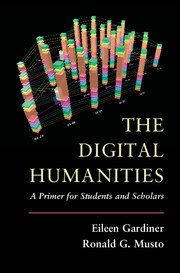Book contents
- Frontmatter
- Contents
- List of Illustrations
- Preface and Acknowledgments
- 1 Introduction to the Digital Humanities
- 2 The Organization of Humanities Research
- 3 The Elements of Digital Humanities: Text and Document
- 4 The Elements of Digital Humanities: Object, Artifact, Image, Sound, Space
- 5 Digital Tools
- 6 Digital Environments
- 7 Publication: Prerelease, Release and Beyond
- 8 The Meta-Issues of Digital Humanities 1
- 9 Meta-Issues 2: Copyright and Other Rights, Digital Rights Management, Open Access
- 10 The Evolving Landscape for the Digital Humanities
- Epilogue: The Half-Life of Wisdom
- Appendix: Digital Tools
- Notes
- Glossary
- Bibliography on Digital Humanities
- Index
8 - The Meta-Issues of Digital Humanities 1
Published online by Cambridge University Press: 05 July 2015
- Frontmatter
- Contents
- List of Illustrations
- Preface and Acknowledgments
- 1 Introduction to the Digital Humanities
- 2 The Organization of Humanities Research
- 3 The Elements of Digital Humanities: Text and Document
- 4 The Elements of Digital Humanities: Object, Artifact, Image, Sound, Space
- 5 Digital Tools
- 6 Digital Environments
- 7 Publication: Prerelease, Release and Beyond
- 8 The Meta-Issues of Digital Humanities 1
- 9 Meta-Issues 2: Copyright and Other Rights, Digital Rights Management, Open Access
- 10 The Evolving Landscape for the Digital Humanities
- Epilogue: The Half-Life of Wisdom
- Appendix: Digital Tools
- Notes
- Glossary
- Bibliography on Digital Humanities
- Index
Summary
There are many issues surrounding the digital humanities that are beyond the question of the scholarship itself and its contribution to either the individual disciplines or to useful knowledge generally. While humanists outside academia need to be less concerned with many of these issues, academics must be acutely aware of them for their own success and the success of their work. In this chapter we will discuss the education of the digital humanist; stratification; collaboration; publication, distribution, discoverability; preservation; reader and author; funding strategies; sustainability; HTP (hiring, tenure and promotion) issues; gender, global and other divides; and digital theory. In Chapter 9 we will examine copyright and other rights, DRM (digital rights management) and open access.
EDUCATION
One of the chief hallmarks of the first Renaissance humanists was their insistence upon a new style of education that would reform the methods of the medieval schoolmen in the universities and transform individuals through a knowledge of past models and of the skills needed to communicate this knowledge for the present. While humanists eventually found their place within the university and derived their name, humanista, from the studia humanitatis that they taught – largely the disciplines of grammar, rhetoric, moral philosophy and poetry (including history writing): what today would cover most humanities faculties – the impact of Renaissance humanism went well beyond academic disciplines. Pier Paolo Vergerio, Leonardo Bruni, Aeneas Silvius Piccolomini, Battista Guarino, Baldassare Castiglione, Desiderius Erasmus and Juan Luis Vives all produced treatises on education for Europe's lay elites. These works covered education both in formal terms and in subject matter – history and ethical education, for example – and for day-to-day life, in practical matters of courtesy and behavior – everything from life at court to table manners to the martial arts. The education of a Christian prince and of young men and women became hallmarks of a humanist approach intended to be comprehensive and thorough, translating the virtues of the past for the present.
- Type
- Chapter
- Information
- The Digital HumanitiesA Primer for Students and Scholars, pp. 117 - 145Publisher: Cambridge University PressPrint publication year: 2015



